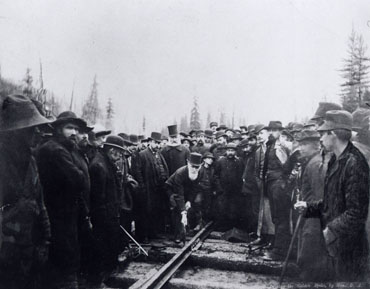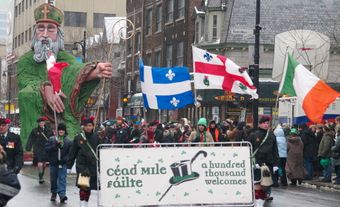A nation is a group of people who share the same illusions about themselves. Academics call it imagining a community. Vancouver cyberpunk novelist William Gibson calls it "consensual hallucination." Whatever you call it, April Fool's Day seems like a good opportunity to think about some of the illusions Canadians have about ourselves.
One illusion we share is that we don't know enough about our own history. The arrival of Canada Day invariably brings with it another poll showing how few Canadians can name three prime ministers, or know the words to the national anthem, or some other piece of national esoterica. The implication being a) this is a bad thing; and b) people in other countries know more. Both these assumptions are wrong. The same polls, with the same results, appear with regularity in the United States and I imagine in other countries as well. Canadians may not know much history, but neither does anyone else.

|
| The symbolic last spike in the building of the CPR was driven by Donald Smith on Nov 7, 1885 (photo by Ross Best & Co, courtesy Library and Archives Canada/C-3693). |
Another illusion suggests that if we did know more about our history Canada would somehow be a "better" place. We have this from no less an authority than Jean Chrétien who stated in 1999 while he was prime minister: "If history were better taught, the country would be healthier."
But there is no evidence to connect knowledge of history with national "health." I remember the enthusiasm for Canadian Studies that swept through the education system in the 1970s, promising to transform every youngster into a walking encyclopedia of Canadiana. The result? The polls show that we are just as ignorant today as we were 30 years ago.
I don't think the issue is whether or not we know enough about our own history. I think the issue is that what we do know is more often than not based on myth. Myths in this sense are not lies, at least not always. Rather, they are simplified expressions of what we think happened. They are stories that we tell ourselves because they seem to embody important cultural values.
One of our most cherished national myths has been the story of the transcontinental railway. Yet another poll, taken in 2000, reported that Canadians considered the construction of the Canadian Pacific to be the second most important event in our history, after Confederation.
According to the myth, the railway made Canada possible by tying it together, coast to coast, with a ribbon of steel. The driving of the last spike in 1885 that completed the line has come to symbolize the birth of the nation. The photographs taken of the event are considered to be the most famous in Canadian history.
Well, yes and no. The Canadian Pacific was not built to create a country but to create profits for its owners. "The Canadian Pacific was built for the purpose of making money for the share-holders and for no other purpose under the sun," said its first general manager. It was built at enormous cost to the public treasury in the form of a generous subsidy, some of which was paid to the Conservative Party to keep it in power. In other words, it was a giant money-laundering scheme. And it was built on the backs of immigrant labourers using land acquired for next-to-nothing from the Aboriginal people. Yet it has been glorified by romantic historians as our "national dream."
Another cherished myth is that there is such a thing as a history of Canada. But we do not all read from the same textbook. If you ask First Nations people to name the most important Canadian historical event, I doubt they would say Confederation or the railway. Contact with Europeans or one of the epidemics that wiped out such a large percentage of their ancestors would surely rank a lot higher.
We like to think, along with Jean Chrétien, that history promotes unity. But history is as much about forgetting as it is about remembering. For instance, we recall with pride the colourful history of the RCMP, especially in the wake of the recent tragic murders in Alberta. But we forget that the force was created as a secret service to spy on Canadians and repress legitimate political activity. Or we describe our society as a tolerant, cultural "mosaic" while forgetting the terrible racism that was at the heart of Canadian culture for generations.
There are many histories of Canada depending on who is telling the story and from what perspective. We would be April Fools to believe that if all Canadians knew the same history the country would be more unified. The time is past when a single master narrative could sum up the complexity of our national experience. Canadian society is too diverse, and in reality always has been. Nowadays, history is about the juggling of perspectives, not the dreaming of national dreams.

 Share on Facebook
Share on Facebook Share on X
Share on X Share by Email
Share by Email Share on Google Classroom
Share on Google Classroom
